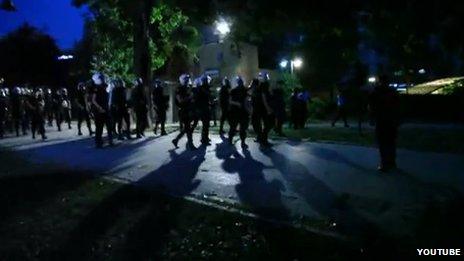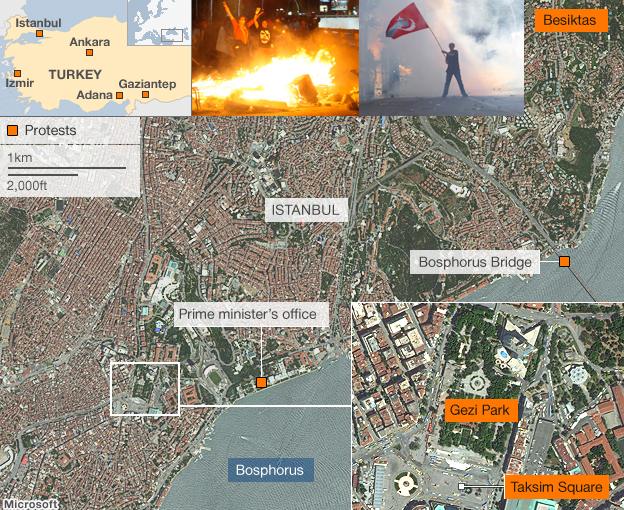Social media plays major role in Turkey protests
- Published

Video footage of Friday's police raid Gezi Park sparked the wider unrest
Social media networks have played a major role in the recent anti-government demonstrations in Turkey. Prime Minister Recep Tayyip Erdogan has recognised this and blamed them for the problems, calling Twitter a "menace".
But for the demonstrators social media has proved an important tool.
They have used Twitter to share information about how to survive the protests; Facebook sites provide news updates on the situation in occupied Gezi Park; while photographs of the protests have been shared on Flickr and Tumblr and video on sites such as YouTube.
Video footage of the police raid on a peaceful demonstration against government-backed plans for the redevelopment of Gezi Park at 05:00 on Friday morning sparked the wider unrest.
Dramatic images were filmed by one of the protesters and posted online.
And photographer Murat Koc filmed the demonstration on Sunday night.
Photographer Murat Koc filmed whilst amongst the demonstrators in Istanbul on Sunday
Those who support the protesters have also used social media. Tens of thousands of people have re-tweeted a message, external which backed the demonstrations written by the Dutch footballer Wesley Sneijder, who plays for the Istanbul-based football club Galatasaray.
Turkish broadcasters have been accused of imposing a news blackout and failing to report on the demonstrations.
Instead, demonstrators have used websites that stream live video.

Dutch footballer Wesley Sneijder expressed his support of the Istanbul protests on Twitter
One of the sites, Bambuser - which has been used heavily by opposition activists in neighbouring Syria - has reportedly been blocked.
Turkish protesters have also tweeted appeals for names of other smartphone applications that they can use to broadcast live on the web. Others have tweeted technical advice about how to overcome internet restrictions if websites seem to be blocked.
The IT news website TechCrunch reports, external that over the weekend Facebook and Twitter were nearly impossible to access in Istanbul and other areas.
Many believe the government blocked internet access in order to prevent news of the protests spreading. However, the largest mobile phone provider Turkcell is reported to have denied that.
And offers of help for the demonstrators have been posted on Twitter throughout the past week.
Amnesty International Turkey and its supporters tweeted the mobile phone numbers of lawyers volunteering legal assistance to those who had been arrested by police.
Some hotels, cafes and bars close to Taksim Square, in which Gezi Park is situated, have tweeted that they welcome protesters, offering them food, water and shelter.
Local residents have also posted the passwords for their personal wireless internet connections so that protesters can stay online.
